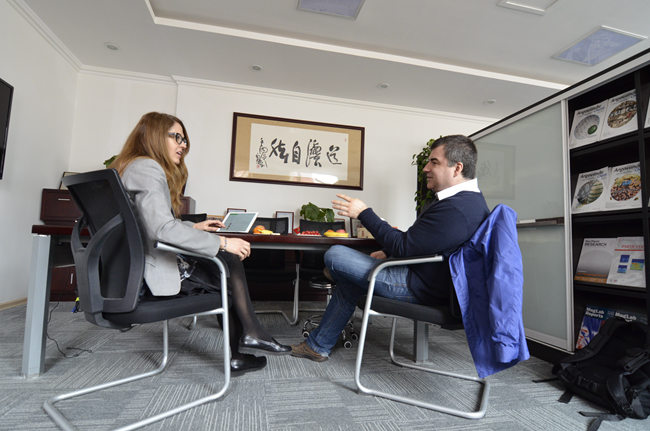Prof. Konstantin “Kostya” Novoselov and his research advisor, Prof. Andre Geim, shared the Nobel Prize in Physics in 2010 for groundbreaking experiments with two-dimensional graphene. These experiments with graphenesurprisingly came out of their “Friday Night Experiments,” which were, according to Prof. Novoselov, “side projects outside the usual research we were doing.” “We saw how STM users used Scotch tape to clean off graphite, and wewanted to try [these layers] in a device. So, we made the layers thinner and thinner. We really wanted to get one atomic layer. It took about a year, but we figured it out.”This “side project” quickly became an international phenomenon and sparked an amazingly broad range of graphene research and development that continues to impactscience and technology in significant and unexpected ways.
ProfessorNovoselovshared this story and his exciting new research endeavors with faculty, staff, and students at DICP during a visit to the institute on Saturday, April 4. In a tightly packed lecture room, students were scrambling to collect chairs to stand on in order to catch a glimpse of his presentation from the doorways. Prof. XinheBao, who was Prof. Novoselov’s host for the visit, remarked that he did not expect to see so many students attend the lecture on the Tomb Sweeping holiday weekend. Nevertheless, the students were clearlyexcited to learn about his research, and not unlike sighting a Hollywood celebrity, they were also eager to have a chance to take photos with him.
Prof. Novoselov’svisit to DICP was prompted byhis involvement in the Beijing - Xiamen Consortiumof the Institute for Complex Adaptive Matter (ICAM), which was jointly established by Xiamen University, BGT Materials Limited, and Fujian Power Booster Tech Co.Ltd. He had heard about the “impressive work” going on at DICP andwanted to come to visit in person and to explore possible collaborations. He is already collaborating and writing a review paper together with Prof. Bao, and during his visit, Prof. Novoselov commented that DICP was, “definitely very advanced in terms of the level of science, level of scientists, and level of equipment.”
In Prof. Novoselov’s view, research on graphenecontinues to bevery healthy, but the exciting experiments are becoming increasingly complex and difficult to perform. Hepersonally has an interestin investigating the potential uses of graphene in medicine and bioapplications. Graphene is “a perfect membrane which you can control, and biology is all about membranes.” He is, however, spending the majority of his research efforts working on a number of non-graphene materials that are one atom thick. He stacks these one-atom-thick layers in novel ways to create sandwich-like heterostructures. Each layer combination of theheterostructuresgives the resulting materialspecial properties and functionalities. In fact, Prof. Novoselovhopes to establish collaborative projects with DICP researchers to explore how these unique properties of heterostructures can be used in catalysis.
Prof. Novoselov’s involvement in ICAM has led him to spend some time in China, including a one-month visit to Xiamen. He has learned some Chinese words but confesses that his skill in Chinese brush painting “is progressing much, much better” than his Chinese. He even had a special desk installed in his office for drawing and painting.As for his impressions about Chinese food?Prof. Novoselov couldn’t pick just one dish as a favorite, as there were so many, but he is impressed by the large variety of food offered in China.
It is clear thatProf. Novoselovhas a creative, playful, and of course very successful approach to science, and in advising younger researchers on how to succeed in science, Prof. Novoselov doesn’t think there are any rules you can follow that will lead one to success. “The only advice I could give is not to follow advice and develop your own style. I am still learning,” he said. “Work closely with good people and learn from their success and their mistakes.”

More about Prof. Novoselovand his work can be found on his University of Manchester website at http://www.condmat.physics.manchester.ac.uk/people/academic/novoselov/ and at nobelprize.org